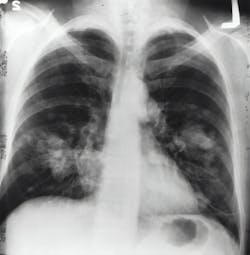Assay identifies patients with non small-cell lung cancer eligible for specialized therapy
The U.S. Food and Drug Administration (FDA) has approved the use of the Roche's VENTANA PD-L1 (SP263) Assay in non-small cell lung cancer (NSCLC) as a companion diagnostic test for Tecentriq, according to a news release from Roche.
The current standard of care for patients with early stage lung cancer is surgery to remove the tumor, which may be followed by chemotherapy. For about half of these patients, the cancer will return following surgery.
Tecentriq received FDA approval as adjuvant treatment following surgery and platinum-based chemotherapy for adults whose Stage II-IIIA NSCLC tumors have PD-L1 expression on at least 1% of tumor cells. The VENTANA PD-L1 (SP263) Assay identifies NSCLC patients who may be eligible for Tecentriq (atezolizumab) monotherapy in this indication.
The VENTANA PD-L1 (SP263) Assay was used as part of the IMpower010 study sponsored by Genentech, a member of the Roche Group, to identify patients whose tumors expressed the PD-L1 protein. The IMpower010 clinical study began in 2015 with the goal of understanding how patients would respond to treatment with Tecentriq following traditional surgery and chemotherapy. In 2021, Genentech reported a 34% reduction in the risk of disease recurrence or death amongTecentriq patients whose tumors were shown to express PD-L1 protein.





